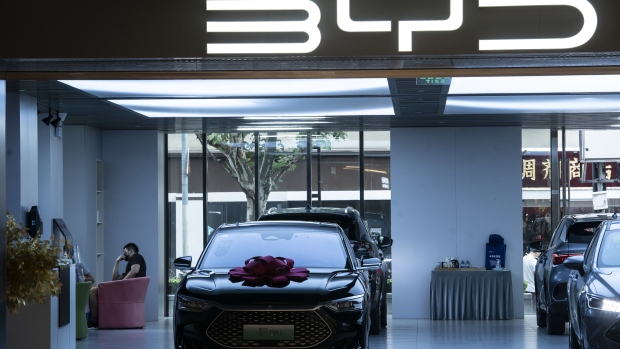Sep 13, 2022
BYD Is a Giant in China and Still Finding Its Footing Overseas
, Bloomberg News

(Bloomberg) --
Expectant owners of BYD Co. electric cars in Australia recently discovered they won’t get the warranty they were promised, triggering an outcry and 1,660-word response from its under-fire local distributor.
The row between EV Direct, BYD’s exclusive distributor in Australia, and prospective buyers is a setback for China’s biggest electric-car maker and its efforts to become a global brand. This was already going to be a tall order for the Berkshire Hathaway Inc.-backed company, whose vehicles are little known outside China. The dissatisfaction of would-be customers in Australia has spurred a Change.org petition that’s garnered some 1,400 signatures.
Here’s what happened: EV Direct offered customers a seven-year, unlimited-kilometer warranty for their Atto 3 crossovers, then unilaterally changed terms before customers took delivery. The warranty has been cut to six years and 150,000 kilometers, with some components covered for shorter periods.
EV Direct has tried to convince customers the warranty has changed for the better, noting it will provide “a best-in-class eight-year warranty on the most valuable part of the BYD product — the LFP blade battery.” Buyers in Hong Kong and New Zealand, however, still get a full six years on the complete car. EV Direct referred requests for further comment to BYD.
The tinkering with small print has soured the deal for several prospective buyers, including PK Saxena, who featured in a Bloomberg Businessweek story in July. He spoke back then about how keen he was to get behind the wheel of a BYD. He’s now canceled his order.
As BYD is quickly finding out, charting an expansion is one thing, and executing that plan is another — whether one chooses to go it alone or appoint a local partner. The automaker has a lot of markets where it’s going to have to make those calls, as it’s set its sights on countries from Germany to Thailand.
Other much smaller Chinese carmakers including Nio Inc. and Xpeng Inc. also are looking to make inroads abroad. Many have primarily targeted northern Europe early on, with Norway being a popular initial market.
The warranty dust-up isn’t big enough to be fatal to BYD in Australia, but it’s a cautionary tale nonetheless. It also highlights the varying expectations and cultural challenges that moving into new markets entails. Back home, BYD’s cars are known for their high-tech features. Translating that to a non-Chinese audience isn’t going to be easy, especially if the company distributing its vehicles suddenly gets cold feet about covering issues with the infotainment for as long as initially promised.
Name recognition is another issue. Take the Atto 3, for example. This model sells as the Yuan in China and is hugely popular there. Tesla Inc. hasn’t felt the need to change up what it calls its cars across different markets. BYD deciding that it needs to indicates a lack of familiarity with the nameplate overseas.
It’s still the early days of BYD building its presence abroad. Last week, the company signed a land-purchase deal in Thailand to construct its first EV plant in Southeast Asia, building on a partnership with local distributor Rever Automotive. In August, it highlighted Cambodia and Denmark as the latest nations in its global push, on top of Japan, Sweden and Israel.
While it still has a lot to prove, BYD has the resources to get traction outside China. Net income in the six months through June tripled from a year earlier as revenue jumped almost 70%. It’s reached the scale where earnings back home are plentiful enough to support big ambitions elsewhere.
©2022 Bloomberg L.P.





